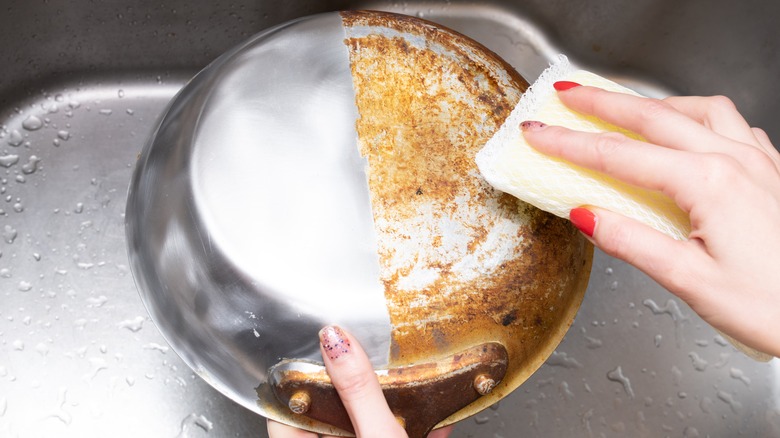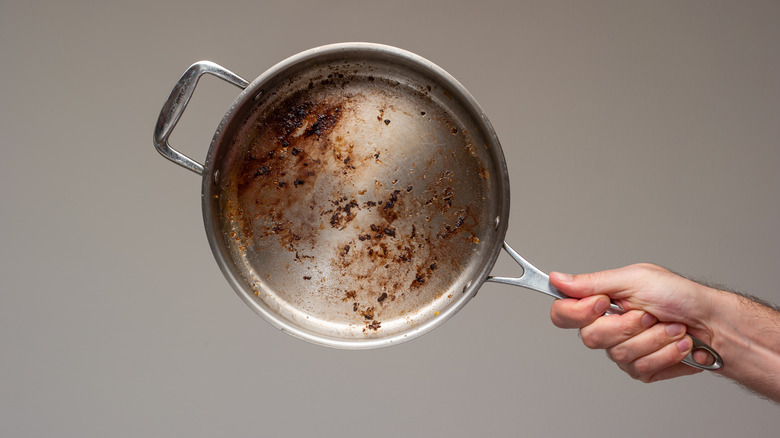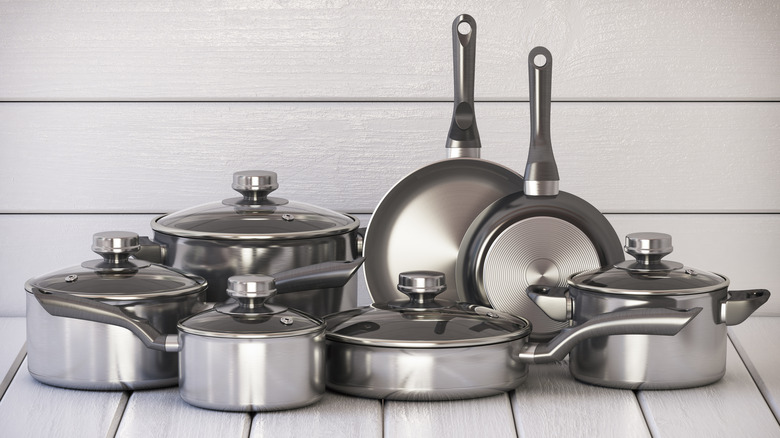How To Clean Blackened Aluminum Pans Correctly
If you're about to toss out your aluminum pans because they've been discolored with unappetizing and seemingly irreparable stains, hold off — they can be fixed! Even better, the items that you need to take care of the black stains are likely already sitting in your pantry; all you need is some baking soda or a few spoons of salt.
One way to clean a blackened aluminum pan is to rinse it, soak it in warm soapy water, and then use good ol' baking soda and scrub away the grime with a gentle sponge. Known for its mildly abrasive properties and cleaning prowess in the kitchen, baking soda can clean everything from dirty Dutch ovens to non-stick pots, cast iron pans, and even aluminum utensils. Simply make a paste of baking soda and water, rub it over the blackened bits with a soft brush, and the stains should come right off when rinsed. Even salt can come to the rescue: Just add a few tablespoons to some water in the blackened pan, bring it to a boil, and then scrub it as usual once the liquid has cooled down — that should take care of any unsightly residue.
After your pans are nice and clean, it may be helpful to understand why they blackened in the first place. If you know the culprit behind the nasty discoloration, you'll have a better chance of preventing in the future.
Reasons why aluminum pans blacken
Aluminum pans are popular for many reasons: They are cheaper than cookware made from other materials, they are excellent conductors of heat, and they are incredibly light and easy to maneuver. They do have their downsides though, as aluminum is extremely volatile and can react negatively when exposed to certain elements — it's one of the many possible reasons why there may be black stains in your pan. Aluminum doesn't react well with anything that is acidic or alkaline in nature. So if you've whipped up some tomato sauce or cooked a dish with a generous splash of wine or soy sauce, don't be surprised if you find a dark black stain waiting at the bottom of the pan.
Although aluminum is a great conductor of heat, which means that it can reach high temperatures very quickly, exposure to such temperatures over long periods of time can also cause discoloration, and stains could simply be due to burnt food. But other times, the cause of the staining could be far less obvious: It could very well be the fact that you're cleaning the pan in a dishwasher. The hot water, the hardness of the water, and the alkaline nature of dishwashing tablets can all react with the aluminum and cause the pan to blacken. Instead, the best thing to do is to hand-wash it after cooking.
Tips to care for your aluminum cookware
Although black stains are nothing that some baking soda or salt can't tackle, taking care of your aluminum pans will ensure that they don't blacken too often and last for a longer period of time. For one, consider seasoning an aluminum pan as you would season a wok or cast iron; doing so will make food less prone to sticking to the surface and burning (which can be the culprit of stubborn black spots). To season, coat the insides of the pan in a layer of oil and get it as hot as you can over low heat, so as long as it doesn't smoke. Take it off the heat once the oil darkens — which takes about 20 minutes or so — let it cool down, and then re-do the same process two more times.
Also, try not to cook food in an aluminum pan at very high temperatures, and make sure to only use gentle utensils that won't scratch when you stir things around — think ladles and spatulas made from silicone, for example. When it's time to rinse the pan, try to use gentle detergents and non-abrasive sponges so that you don't damage the surface. Make sure that you dry your pan properly at the end too — even lingering spots of water and damp patches can cause discoloration.



